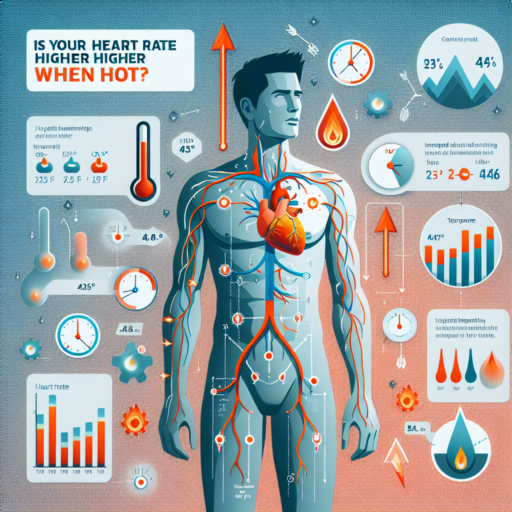Can being too hot raise your heart rate?
Certainly, high temperatures can have a significant impact on your heart rate. When the environment is excessively hot, your body works harder to try to cool itself, leading to an increased heart rate. This physiological response is part of the body’s effort to manage internal temperatures and prevent overheating, which could lead to heat-related illnesses.
To understand this process, it’s essential to consider how the body reacts to high temperatures. When you’re exposed to a hot environment, your body increases blood flow to the skin’s surface, allowing heat to escape through sweating. This mechanism, while effective in cooling the body, requires the heart to pump more blood, leading to an increase in heart rate. This response is an indication of your body’s attempt to maintain a stable internal temperature, often referred to as thermoregulation.
Moreover, certain factors can exacerbate the effect of heat on heart rate. Dehydration, for instance, can significantly affect the body’s ability to cool itself, thereby increasing heart rate further. Similarly, wearing heavy or non-breathable clothing in hot weather can impede the body’s natural cooling processes, leading to a higher heart rate. It’s crucial for individuals, especially those with pre-existing heart conditions, to stay hydrated and dress appropriately in high temperatures to help manage their heart rate effectively.
Understanding how heat affects heart rate is essential for taking proactive measures to safeguard your cardiovascular health during hot weather. Whether it’s through staying hydrated, dressing in lightweight clothing, or avoiding excessive exposure to high temperatures, being mindful of these simple precautions can help maintain a healthy heart rate and prevent heat-related stress on the body.
No se han encontrado productos.
Why is my resting heart rate higher in the summer?
Many people notice a noticeable increase in their resting heart rate during the warmer months. This physiological phenomenon is not arbitrary but is closely linked to how our bodies react to increased temperatures. When the mercury rises, our bodies have to work harder to maintain a stable internal temperature, leading to an elevation in heart rate even when at rest.
Dehydration plays a significant role in this shift. In summer, the body loses more fluids through sweat in an effort to cool down. This loss of fluids thickens the blood, making it more challenging for the heart to pump it through the body, thereby increasing the heart rate. Ensuring adequate hydration is crucial during hot weather to mitigate this effect.
Another factor is the stress on the cardiovascular system caused by the heat. High temperatures can cause the blood vessels to dilate, which forces the heart to beat faster to ensure proper blood flow throughout the body. This added workload on the heart contributes to a higher resting heart rate. Physical activities, even routine ones, become more strenuous in the heat, further elevating heart rate levels beyond what we experience in cooler conditions.
Does running in heat make your heart rate higher?
When we think about running in heat, it’s natural to wonder how our bodies react, particularly in terms of heart rate. The straightforward answer is yes, running in heat can cause your heart rate to rise more than running in cooler conditions. This increase is due to several physiological factors that kick into gear as the body tries to cool itself while maintaining the demands placed on it by running.
Firstly, when you run in hot weather, your body needs to work harder to dissipate heat. This is primarily done through sweating and increasing blood flow to the skin. However, these mechanisms also mean that there’s less blood being directed to your muscles, which in turn makes your heart pump harder and faster to supply them with oxygen, thus leading to an increased heart rate. Furthermore, the heart is also directly affected by heat, which can make its job of pumping blood more challenging.
In consideration of these physiological responses, it’s essential to understand how significantly the heat can impact your workouts. Adjusting your pace and hydration strategies is critical to manage the increased demands placed on your heart and overall body when running under the scorching sun. Recognizing the signs of heat exhaustion and staying within safe heart rate zones becomes even more critical to avoid heat-related illnesses.
Does your heart rate increase to keep you warm?
When temperatures drop, the body employs various mechanisms to maintain its core temperature and protect vital organs. This natural response includes physiological changes that can lead to an increased heart rate. But how exactly does this process work to keep us warm?
Understanding the Body’s Response to Cold
The connection between heart rate and body temperature regulation is an intriguing aspect of human physiology. When exposed to cold environments, your body activates its internal heating system. One key player in this warming process is the thyroid gland, which releases hormones that can cause your heart to beat faster. This acceleration in heart rate is part of the body’s attempt to generate heat through increased metabolism and blood flow, effectively distributing warmth to peripheral areas that are most susceptible to the cold.
Shivering Thermogenesis and Heart Rate
Another critical factor to consider is shivering thermogenesis, a process where involuntary muscle contractions produce heat. As you shiver, your body requires more oxygen and nutrients to fuel these muscle contractions, which in turn prompts your heart to pump more vigorously. This not only helps in raising the body’s core temperature but also highlights the direct effect of cold exposure on heart rate variability.


